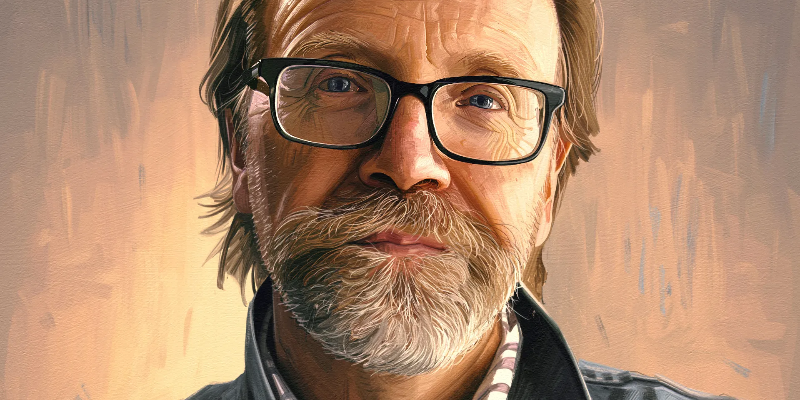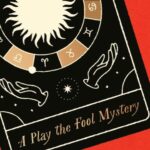Illustration by Krishna Bala Shenoi.
Talk Easy with Sam Fragoso is a weekly series of intimate conversations with artists, authors, and politicians. It’s a podcast where people sound like people. New episodes air every Sunday, distributed by Pushkin Industries.
*
Last fall, George Saunders published Liberation Day, his first short-story collection in nine years. This week, we return to our conversation with the beloved author to celebrate the paperback release.
At the top, we discuss his process creating the book, the influence of Chekhov and Gogol, and a timely passage on democracy from “Love Letter”. Then, we unpack how he builds stories, a guiding philosophy from our first talk, and an excerpt from the titular story, “Liberation Day”.
On the back-half, we talk about the power of revision through “Elliott Spencer”, the seeds of the book’s moving final story, “My House”, the ‘failures in compassion’ it reveals, Saunders’ enduring relationship with his wife, and how he hopes to continue surprising himself as a writer, at 63.
Subscribe and download the episode, wherever you get your podcasts!
From the episode:
Sam Fragoso: On the subject of writing, I was going to ask you– at 63, what compels you to keep doing this? To sit there and try to produce something on a blank page. Then, I remembered, you and I discussed this very thing at the beginning of 2021. You said:
When you ask why someone would read a short story, or write one, it’s all about the microfluctuations of the mind. You start a story with nothing in mind, you pick it up and suddenly there’s Scrooge or whoever, and then when you come out the other end of it, you’re in a different state. The same is true of a song. If you think that different state is preferable, then that’s proof of concept. It doesn’t last forever— maybe half an hour, but I feel at this stage of my life that’s better than nothing. It’s better than not feeling that way.
George Saunders: I like the idea of alteration. You come in in one state, and you go out in another. It occurs to me that the reason I’m still interested in it is— to have written a book and surprised yourself in the process is so fun. To say, ‘Oh I wasn’t done after all. There are still other selves to come forward.’ When I was younger, I had a more complicated matrix of motivation. There was ambition, for sure. Earning a living. Now it feels like the form is taunting me. I realize how little I’ve done in writing, and how vast it is. There are new places to go. Just the idea of spending the next year popping out new kinds of stories makes me really happy.
SF: Is that what you see when you look ahead?
GS: Yeah. On one level, that’s kind of both good and bad. Fast forward and I’m 96, hey he had eighteen more stories, whoops he’s dead. There’s another level for me which also has to do with alteration. Can I actually become a more relaxed, generous, loving person? I always had this idea that someday I’ll do a big retreat, or I’ll get back to meditating more regularly. But– I tend to not. So, I don’t know. It’s on my mind. Left to my own devices, I’m a pretty productive, pretty anxious, semi-loving person. That’s not probably going to be good enough. At some point that’s going to wear thin.
SF: You’re all these people at once.
GS: A certain person is dominating in a given moment. To me, it’s a thrilling idea that you could change that. You could somehow do certain things, and a different aspect of yourself would be dominant. Just thinking back on the time I was the biggest mess, versus the time I felt the very best, the thing is— the world changes around that person. And because the state of your mind is different, the world coming in is actually processed differently. It’s an incredible opportunity.
SF: You’ve talked about the power of art being that, if it works, you leave it on the other side just slightly different. You enter a different kind of state. And, I have to say, having read every page of Liberation Day, I left it feeling just like that: in a different state.
GS: How would you characterize a different state?
SF: I’d characterize it the same way we characterized it earlier. Which was— when something horrible happens, like a death, or something great happens, like a job promotion, these big things sort of snap you out of the quotidian. Like a snow globe, it jostles you around a little, and it makes you actually look around with a fresh set of eyes, the same way you do walking out of a movie theater when the movie is good. You go into the theater in a certain way, you walk out and think, wow, even the not-so-interesting restaurant that is in front of me has a glimmer to it.
GS: I always think after a good work of art, the birds matter more, like story birds. Something like that. Yeah, that’s beautiful.
SF: Everything else that’s not me… that falls away, and then it doesn’t. I have felt the same way in this conversation, now as we have to leave it.
GS: We have to leave? We can stay another couple hours [Laughs]. I really loved being with you. You’ve got an incredible mind.
SF: George Saunders, the pleasure has been all mine.
GS: Thank you so much.
__________________
George Saunders is the #1 New York Times bestselling author of eleven books, including A Swim in a Pond in the Rain; Lincoln in the Bardo, which won the Booker Prize; Congratulations, by the Way; Tenth of December, a finalist for the National Book Award and winner of the inaugural Folio Award; The Braindead Megaphone; and the critically acclaimed collections CivilWarLand in Bad Decline, Pastoralia, and In Persuasion Nation. He teaches in the creative writing program at Syracuse University.
Sam Fragoso is the host of Talk Easy with Sam Fragoso, a weekly series of conversations with artists, activists, and politicians. His writing has appeared in The Atlantic, Vanity Fair, and NPR. After conducting seminal interviews with icons like Spike Lee, Werner Herzog, and Noam Chomsky, he independently founded Talk Easy in 2016.




















